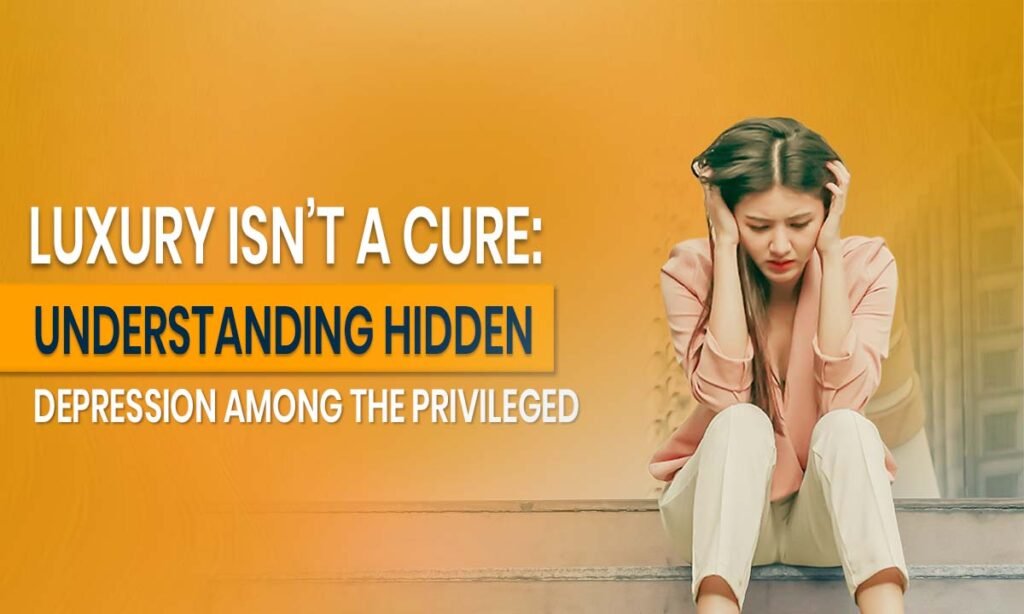
In today’s fast-paced, image-driven society, the pursuit of wealth and luxury is often equated with happiness. However, there’s a growing awareness about a troubling reality: hidden depression among the privileged. Many individuals from affluent backgrounds, surrounded by wealth, status, and material comfort, are silently battling mental health challenges. The misconception that luxury can shield people from emotional distress or provide an antidote to depression is both dangerous and misguided.
This article delves into the complex relationship between luxury, mental health, and the stigma that often surrounds it. By examining the intersection of privilege and depression, we hope to shed light on a crucial issue that needs more attention.
Table of Contents
ToggleUnderstanding Hidden Depression Among the Privileged
Hidden depression, or what is sometimes called high-functioning depression, refers to individuals who appear outwardly successful but are struggling internally with symptoms of mental illness. These individuals can be found in high-pressure environments where societal expectations demand constant success and perfection. In many cases, the mental health stigma prevents them from seeking help, as they may feel that their affluence should somehow negate their emotional struggles.
Affluent people often feel the weight of maintaining a flawless exterior. The societal pressure to “have it all” can create an overwhelming sense of isolation and anxiety. Many affluent individuals find themselves trapped in a cycle of working harder to accumulate more wealth and luxury, believing that this will fix their internal void. Unfortunately, this is rarely the case.
The Myth of Luxury as a Cure for Mental Health Struggles
Luxury and material wealth are often mistakenly seen as cures for depression. It’s easy to assume that if you can afford the best cars, homes, vacations, and clothing, your life must be perfect. But in reality, these external markers of success do little to address the root causes of mental health issues like hidden depression.
For example, take the case of a well-known entrepreneur who, despite his multimillion-dollar business empire, struggled with substance abuse and depression in private. He had everything society considers necessary for happiness, yet the pressure and emptiness he felt remained. His story is just one of many that highlight the disconnect between luxury and emotional well-being. The common misconception that wealth can shield individuals from psychological struggles needs to be debunked.
How Luxury Can Mask, Not Heal, Emotional Pain
There’s no denying that luxury can bring temporary happiness. A lavish vacation might offer a brief escape, and shopping sprees might provide a moment of joy. However, these are superficial fixes that do not address the deeper issues at play.
The affluent often use luxury as a shield to cover up their emotional pain. This is sometimes referred to as “hedonistic escapism”—the idea that indulging in pleasurable experiences or acquiring more material possessions can help distract from underlying emotional turmoil. Unfortunately, this approach is not sustainable.
As the weeks go by, the high of luxury fades, and the emotional pain returns. This cycle of momentary satisfaction followed by inevitable emotional relapse is a hallmark of hidden depression among the privileged. Wealth, status, and luxury can mask depression, but they cannot cure it.
Substance Abuse and Mental Health Challenges in Privileged Circles
In some affluent circles, substance abuse is an all-too-common coping mechanism for hidden depression. The pressures of maintaining a public image of success can lead to reliance on alcohol, drugs, or other substances to numb emotional distress. This self-medication may seem to provide temporary relief, but it often exacerbates the underlying issues, leading to even more significant mental health challenges.
Take the example of an influential business executive who, despite his wealth and achievements, turns to alcohol after each long day of meetings. On the outside, he’s seen as a confident and successful leader, but internally, he struggles with feelings of worthlessness and isolation. His substance use is a way to silence these painful emotions. However, it only creates a vicious cycle of dependency and deeper depression.
The Role of Mental Health Stigma in Preventing Help-Seeking
One of the most significant barriers to addressing hidden depression among the privileged is the stigma surrounding mental illness. In many affluent communities, seeking therapy or counseling is viewed as a sign of weakness. These individuals may fear that admitting to mental health struggles will tarnish their carefully crafted image or cause others to perceive them as fragile or flawed.
This mental health stigma is pervasive and can prevent even the most successful individuals from seeking the help they need. For many, the idea of appearing vulnerable in a world that values strength and success above all else is simply not an option. As a result, they continue to suffer in silence, unable or unwilling to address their emotional struggles.
Moving Beyond the Myths: A Path to Healing
It’s essential to recognize that luxury alone cannot solve hidden depression. The key to healing lies in addressing the root causes of mental illness, seeking professional help, and understanding that emotional well-being requires more than just external success.
The first step in breaking the cycle of hidden depression is acknowledging the issue. This requires a shift in mindset, where mental health is treated with the same priority as physical health. Just as someone would seek treatment for a physical illness, seeking therapy or counseling should be viewed as a vital step toward overall well-being.
In addition, there needs to be a greater effort to break down the mental health stigma that prevents people from seeking help. By encouraging open conversations about mental health and challenging outdated perceptions, we can create a more supportive and understanding environment for everyone, regardless of their social status.
Real-Life Example: Athena Luxus’ Commitment to Mental Health
Athena Luxus, a luxury brand committed to redefining how we view success, takes mental health seriously. In an industry where outward appearances often take precedence, Athena Luxus emphasizes the importance of self-care and mental wellness. The brand promotes a balanced approach to life, one where emotional health is prioritized as much as physical appearance or financial success.
Through their platform, Athena Luxus strives to create a culture of well-being, where individuals can openly discuss their struggles with mental illness and seek help without fear of judgment. This commitment to holistic wellness serves as a reminder that luxury is not just about material possessions but also about cultivating a healthy and balanced life.
Conclusion
In conclusion, hidden depression among the privileged is a growing issue that needs more attention. Luxury, while it may bring temporary comfort, cannot address the deeper emotional struggles faced by those living with mental health challenges. It is essential to break free from the misconception that wealth and success guarantee happiness. Instead, we must recognize that true well-being comes from within, and that mental illness, like any other health issue, deserves to be treated with care and respect.
At Athena Luxus, we believe that true luxury comes from within—the luxury of emotional freedom, mental peace, and self-acceptance. It’s time to challenge the myths that equate wealth with happiness and create a world where mental health is prioritized for all, regardless of their financial status.
Frequently Asked Questions
Ques 1- What is hidden depression among the privileged?
Ans 1- Hidden depression refers to individuals who appear successful but internally struggle with emotional pain, often due to societal pressures and stigma around mental health.
Ques 2-Can luxury and wealth cure depression?
Ans 2- No, luxury and wealth may provide temporary distractions but do not address the deeper emotional struggles that cause depression, which requires professional help and self-care.
Ques 3- How does the stigma around mental health affect the privileged?
Ans 3- The stigma prevents affluent individuals from seeking help, as they fear it may tarnish their image of success, causing them to suffer in silence.
Ques 4- What role does substance abuse play in hidden depression among the privileged?
Ans 4- Substance abuse often serves as a temporary escape for individuals dealing with hidden depression, but it only exacerbates their mental health struggles in the long run.
Ques 5-How can we break the cycle of hidden depression among the privileged?
Ans 5- Breaking the cycle involves acknowledging mental health struggles, seeking professional help, and fostering open conversations to challenge stigma and prioritize emotional well-being

